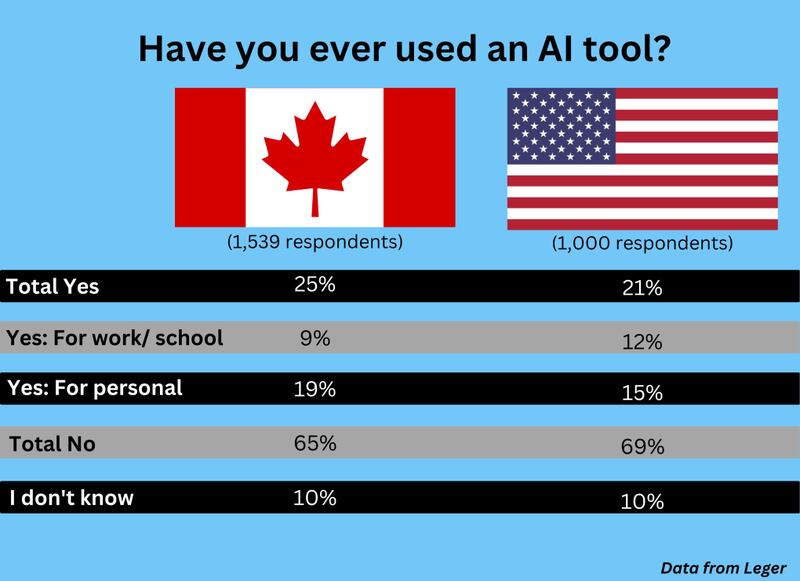New technology involving artificial intelligence (AI) such as ChatGPT and Google Bard are dominating conversations and headlines across Canada.
But what do Canadians really think about AI, and how many have used the technology?
A new survey by Leger, published Feb. 23, dives into what Canadians and Americans think about AI tech and how familiar they are with its uses.
A sample of 1,539 Canadians and 1,000 Americans over the age of 18 were randomly selected for the survey. The questionnaire had 25 questions and was collected between Feb. 10 and Feb. 12.
- 5 Things to Know newsletter: Sign up to start your day with the biggest stories
The survey found the majority (65 per cent) of Canadian respondents had not used an AI tool, with 19 per cent saying they had in a "personal context" only. About nine per cent said they had used AI for work or school.
Broken down by age, about 44 per cent who said they had used AI tools were between the ages of 18 to 34.
According to the data, Alberta had the highest number of people (30 per cent) who had used AI before, followed by 26 per cent of respondents in Ontario and 24 per cent in Manitoba and Saskatchewan.
Overall, 25 per cent of Canadians say they had used AI before, versus 21 per cent of Americans.
'DO YOU TRUST AI TOOLS?'
Overwhelmingly, many Canadians do not trust AI to be involved in their more personal day-to-day life.
When asked if they would trust AI to teach children, about 48 per cent said "not at all." Similarly, 43 per cent said they would not trust AI to transport them from one place to another without a driver.
About 41 per cent of Canadians said they wouldn't trust AI to help find them a life partner.
However, when it comes to completing tasks at home or answering questions about a product online, Canadians are more likely to trust AI. About 46 per cent said they trust the tech to turn down music or adjust the thermostat in their home.
- We interviewed ChatGPT, here's what it said
Roughly 41 per cent said they would "somewhat" trust AI to answer questions via a website chat.
According to the survey, younger Canadians tended to trust AI more than older Canadians with many tasks.
The reason Canadians may not trust AI could be linked to people believing "they lack emotion/ empathy required to make good decisions." About 37 per cent strongly agreed AI can't make good decisions due to its lack of human emotion.
Canadians also said they believe AI is susceptible to fraud or hacking.
'HOW FAMILIAR ARE YOU WITH AI TOOLS?'
AI can come in many forms, such as smart home features or facial recognition detection technology. The majority of Canadians (41 per cent) are "somewhat familiar" the survey says, with home-based AI tools like robot vacuums.
Canadians were second-most familiar with facial detection software AI tools, with 38 per cent saying they were somewhat familiar.
Tools like ChatGPT and Synthesia which create content such as text, images and voices are the most unfamiliar to Canadians, according to the survey. About 43 per cent of respondents said they were "not at all familiar" with the AI tools.
Younger Canadians, aged 18 to 34, were more familiar with AI tools than older Canadians above the age of 35.
Canadians aged 18 to 34 were most familiar (65 per cent) with home-based AI tools and least familiar (43 per cent) with content creation AI like ChatGPT. Older Canadians were least likely to be familiar with any AI tools.
Between Canada and the U.S., Americans were more familiar across the board with all AI tools, despite not using them as much as Canadians.

'DO YOU BELIEVE AI IS GOOD FOR SOCIETY?'
With somewhat of an understanding of how AI works and what it is used for, about 36 per cent of Canadians believed the tech is good for society. The positive opinion increased to 52 percent for younger Canadians and decreased for those aged 55 and older to 25 per cent, the survey shows.
Manitoba and Saskatchewan residents were most likely (39 per cent) to believe AI is bad for society compared to the second-highest (31 per cent) negative response from B.C. respondents.
Compared to the U.S., Canadians had better positive attitudes towards AI than Americans, with 36 per cent of respondents from Canada saying the tech is good for society compared to 32 per cent of respondents from the States.
--------------
A margin of error cannot be associated with a non-probability sample in a panel survey. For comparison purposes, a probability sample of this size would have a margin of error ±2.50%, 19 times out of 20 for the Canadian sample and of ±3.09%, 19 times out of 20 for the American sample. The results presented in this study comply with the public opinion research standards and disclosure requirements of CRIC (the Canadian Research and Insights Council) and the global ESOMAR network.






























































































